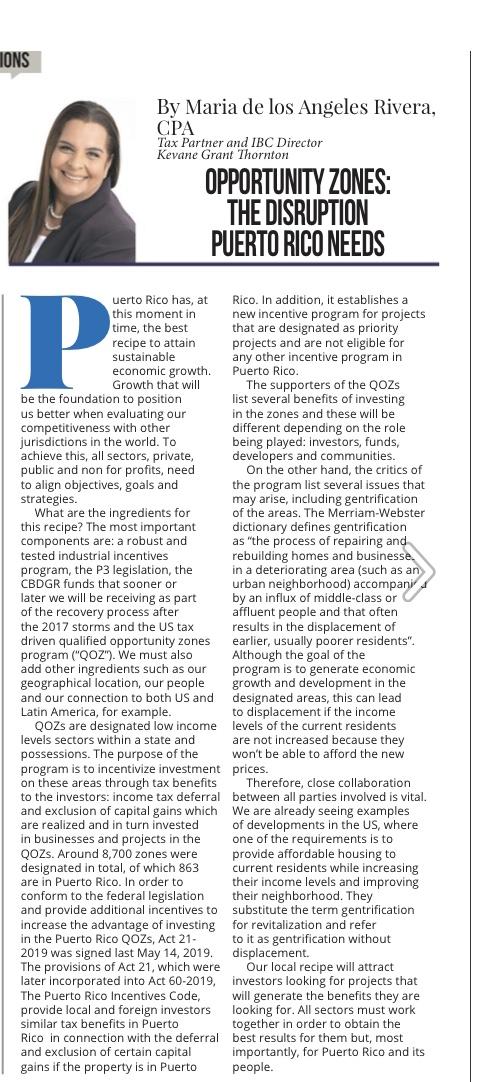-
Financial statements audits
Financial statement audits
-
Compliance audits
Compliance audits
-
Compilations and reviews
Compilations and audit
-
Agreed-upon procedures
Agreed-upon procedures
-
Tax compliance
Business Tax
-
Global mobility services
Through our global organisation of member firms, we support both companies and individuals, providing insightful solutions to minimise the tax burden for both parties.
-
Sales and use tax and indirect taxes
SUT/ VAT & indirect taxes
-
Tax incentives
Navigating the complex landscape of tax incentives in Puerto Rico can be challenging. Whether you're looking to benefit from the Export Services Act (Act 20), the Individual Investors Act (Act 22), or other incentives under Act 60, we provide tailored advice to help you maximize your tax benefits and ensure compliance. Let us help you unlock the potential of doing business in Puerto Rico.
-
Transfer Pricing
The laws surrounding transfer pricing are becoming ever more complex, as tax affairs of multinational companies are facing scrutiny from media, regulators and the public

-
Business consulting
Our business consulting services can help you improve your operational performance and productivity, adding value throughout your growth life cycle.
-
Business Risk Advisory
Risk is inevitable but manageable. We deliver relevant, timely and practical advices to aid organizations manage risk and improve business performance. We can help you identify, understand and manage potential risks to safeguard your business and comply with regulatory requirements.
-
Technology Advisory
We provide comprehensive solutions to safeguard your business and ensure operational resilience and compliance. Our expert team offers a range of technology advisory services designed to address your cybersecurity needs, enhance business continuity, and manage security effectively.
-
Transactional advisory services
Transactions are significant events in the life of a business – a successful deal that can have a lasting impact on the future shape of the organizations involved. Because the stakes are high for both buyers and sellers, experience, determination and pragmatism are required to bring deals safely through to conclusion.
-
Forensic and investigative services
At Grant Thornton, we have a wealth of knowledge in forensic services and can support you with issues such as dispute resolution, fraud and insurance claims.

Opinions, The Weekly Journal
Puerto Rico has, at this moment in time, the best recipe to attain sustainable growth. Growth that will be the foundation to position us better when evaluating our competitiveness with other jurisdiction in the world. To achieve this, all sectors, private, public and non for profits, need to align objectives, goals and strategies.
What are the ingridients for this recipe? The most important components are: a robust and tested industrial incentives program, the P3 legislation, the CBDGR funds that sooner op later we will be receiving as part of the recovery process after the 2017 storms and the US tax driven qualified opportunity zones program. We mus also add other ingredients such as our geographical connection to both US and Latin America, for example.
QOZs are designated low income levels sectors within state and possessions. The purpose of the program is to incentivize investment in there areas throug tax benefits to the investors: income tax deferral and exclusion of capital gains which are realized and in turn invested in businesses and projects in the QOZs. Around 8,700 zones were designated in total, of which 863 are in Puerto Rico. In order to conform to the federal legislation and provide additional incentives to increase the advantages of investing in the Puerto Rico QOZs, Act 21- 2019 was signed last May 14, 2019. The provisions of Act 21, which were later incorporated into Act 60- 2019, The Puerto Rico Incentives Code, provide local and foreign investors similar tax benefits in Puerto Rico in connection with the deferral and exclusion of certain capital gains if the property is in Puerto Rico. In addition, it establishes a new incentives program for projects that are designated as priority projects and are not eligible for any other incentive program in Puerto Rico.
The supporters of the QOZs list several benefits of investing in the zones and these will be different depending on the role being playes: investors, funds, developers, and communities.
On the other hand, the critics of the program list several issues that may arise, including gentrification of the areas. The Merriam- Webster dictionary defines gentrification as “the process of repairing and rebuilding homes and businesses in a deteriorating area (such as an urban neighborhood) accompanied by an influx of middle-class of afluent people and that often results in the displacement of earlier, ussually poorer residents”. Although the goal of the program is to generate economic growth and development in the designated areas, this can lead to displacement if the income levels of the current residents are not increased because they won’t be able to afford the new prices.
Therefore, close collaboration between all parties involved is vital. We are already seeing examples of developments in the US, where one of the requirements is to provide affordable housing current residents while increasinf their income levels and improving the neighborhood. They substitute the term gentrification without displacement.
Our local recipe will attract investors looking for projects that will generate the benefits they are looking for. All sectors must work together in order to obtain the best results for them but, most importantly, for Puerto Rico and its people.

